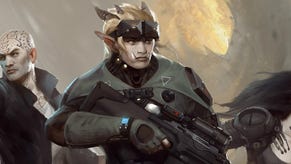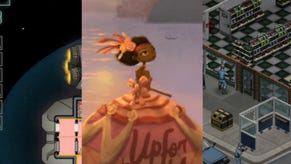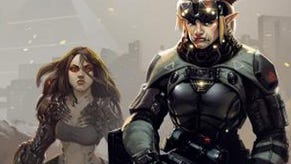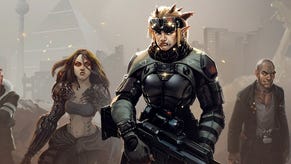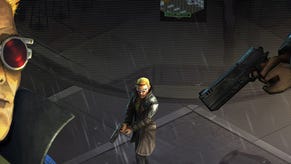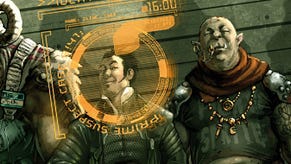Shadowrun Returns: capturing the tabletop vibe
Shadowrun Returns takes the turn-based RPG template back to its hardcore roots. VG247's Dave Cook speaks with Harebrained Schemes founder Jordan Weisman to learn more.
The RPG landscape has changed drastically in recent years. On one hand the popularity of Skyrim has flagged up the genre to new players, while seasoned gamers have had a new wave of hardcore experiences to look forward to thanks to recent crowd-funding efforts.
Kickstarter has helped many pet-projects become a reality, and it is fast becoming the domain of RPGs, with Wasteland 2, Torment: Tides of Numenera, Project Eternity, Divinity: Original Sin and of course, Shadowrun Returns all enjoying great funding success over the past 14 months.
It's clear from the money raised that there is still a thirst for challenging, classic RPG experiences out there, and this is the reason Shadowrun Returns met its goal. People want a game like this to exist.
Developer Harebrained Schemes isn't deviating from the ingredients that made both the pen and paper RPG and the 1993 SNES adaptation so endearing, but it is adding many new elements on top.
This was made clear by the complexity of the team's recent 19-minute gameplay demo, and even at a glance it was obvious that the game won't pander to the uninitiated. It's going to be a deep, complex experience from start to finish.
To get a better handle on what Shadowrun Returns feels like to play, the intricacies of combat, and to discuss the changing face of RPGs today, I spoke with studio founder and creator of the original Shadowrun Jordan Weisman.
"The plot is based on secrets and mysteries, so it’s hard to talk too much about it without giving away something," he began. "You’ve been hired by a woman to find out who killed her brother and 'deal' with them. Along the way, you’ll have to navigate corrupt cops, mega-corporations, body part peddlers, and ancient ... OK that’s enough."
The game's futuristic Seattle of 2054 is going to be teeming with plot strands, dangers lurking in every alley and an assortment of enemies waiting to be engaged in combat. There will be much to consider, but Weisman stressed the game still won't hold your hand. This is meant to be a tough experience for dedicated players.
"Call it respect for the audience or call it old-school gamer mentality but we’re honestly not hand-holding people through a bunch of training on the mechanics," he said. "Once upon a time, there was fun in exploring and experimenting. We hope to give players enough info to get them rolling and understanding the basics."
Watching the team's alpha gameplay demo made it clear that combat will take an open-ended approach. There is great scope to adapt to threats the way you feel is best. Do you take a frontal assault approach and stick your team to cover, or do you try hacking and using alternate routes to gain the upper hand?
The possibilities are vast, and Weisman explained that by combining skills and character types you can really hit your enemies hard, "Our mindset is that you don’t need to balance your team’s skills but there are certainly benefits in doing so. For example, a Street Samurai might have a decent chance of hitting an enemy but if the enemy were slowed by a spell, he would be at a greater advantage.
"Then a Decker might be able to hack the building’s defences and take control of their weapon turrets allowing a Rigger to manoeuvre his drone into an alcove to retrieve a lab specimen while taking minimal damage."
While the gameplay mechanics are complex, Weisman's team wanted to ensure there was a strong 'around the table' vibe flowing throughout Shadowrun Returns, as a way of capturing the pen and paper vibe of tabletop role-playing. I asked him if it was a tricky aesthetic to capture in a game setting.
"As for the 'around the table vibe' that we've talked about – that’s something we’ve played with and yes, it’s tricky," he confirmed. "For awhile, we toyed with the voice of the Game Master talking directly to you and telling you to do a skill check. We also thought about showing dice rolls.
"Ultimately, we decided that it would be interesting but not necessarily compelling or immersive. However, when we release our editor, player-GMs can try this type of experiment out for themselves. Who knows, they may hit on the right way to do it."
The editor in question is the Shadowrun Returns mission tool that will let players act as GM during their own custom missions, complete with a vast library of assets created by Wesiman's team, and the tools necessary to create deep campaigns where almost anything goes. "The tool is extremely deep and powerful and we’re not 'dumbing it down' for release to the public," Weisman continued.
"It is the exact same tool we use to create our Seattle and Berlin stories. The tool runs on Macs and PCs and allows players to become game masters and create their own stories in the Shadowrun universe. Our art team has created a wide range of exterior and interior building blocks from which GMs can create an amazing array of environments to set their stories within.
"GMs can then place NPC characters into these environments controlling them and the overall gameplay via an expansive trigger system which doesn’t require any scripting knowledge yet provides amazing power to the designer. Interactive objects, decking, and conversations all use the same trigger system, so these non-combat options can truly be 'game-changing' in scope."
While it sounds like a powerful tool, it's clear that crafting core scenarios and battles that wrap around environmental features like traps, alternate routes, hacking points and secondary objectives isn't that simple, and Weisman was more than happy to shed light on how the team approached the challenge.
"Yes, we spent a lot of time creating the mechanics for each character archetype and abilities to develop a system to build on – and one that player-GMs could use to create interesting tactical scenarios.
"We approached the design of the story and individual runs the way we used to approach our tabletop gaming sessions by asking, What is the player trying to do here? How will players learn the info they need to learn? What obstacles/resistance/puzzles would be fun here?
"Yes, it’s tricky and it’s challenging, and it’s different from how a lot of computer role-playing games approach development. But from the beginning, we weren’t trying to create a standard CRPG with the look and feel of Shadowrun. We were trying to make a tactical-RPG that felt like the Shadowrun tabletop game, influenced by the SNES and SEGA games".
Once again, the idea of an open editor with vast possibilities is one that might not have made it into the final code, had Shadowrun Returns been made under the wing of a large publisher. I can't think of many console or big studio games - LittleBigPlanet and Minecraft Xbox 360 aside - that allow for such a great deal of freedom.
That said, Weisman did tell me that he feels the big format holders are taking the right steps in embracing the indie mind-set, and the openness it brings, "I think you’re seeing a shift towards supporting indies and there is still much to be done. You would have to be blind to miss the impact that indies are having on game development," he stressed.
"If the platform holders’ goal is to strengthen the gaming ecosystem in order to benefit from it, they need to find way to embrace, encourage, and learn from independent developers who don’t feel constrained by the standard rules of engagement."
I then asked if we could ever expect to see Shadowrun Returns on PS4, given Sony's aggressive approach to scooping up indie developers with its open approach. He simply replied, "It would take a change in our licensing agreement with Microsoft," suggesting the brand is - in some way - still tied up with Microsoft after FASA's Shadowrun FPS release in 2007.
It's through the Shadowrun Returns editor that Weisman hopes to keep the franchise alive and well long after the game launches worldwide later this year. I closed our chat by asking him to reflect on why the brand has endured since the first edition of the tabletop game launched in 1989.
"Shadowrun is alive and well after 24 years because of the fans and players who have kept it going," he replied, "and I fully expect our players to design stories and gameplay in the Shadowrun Returns engine that blows us away – and hopefully keep the universe going for more decades to come".
We'll have more on Shadowrun Returns in the run up to launch. In the meantime, are you pumped for the game? Did you back the Kickstarter? Let us know below.







